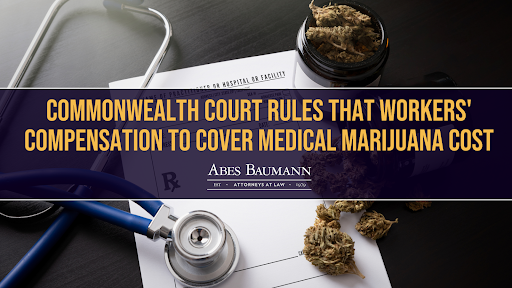Pa. Commonwealth Court rules that workers’ comp should cover medical marijuana cost
abesbaumann
on
April 4, 2023
Article originally posted on Pittsburgh Post Gazette
JOHN FINNERTY
Capitolwire.com
HARRISBURG — Commonwealth Court has ruled that workers’ compensation should cover the cost of medical marijuana for treatment of injuries suffered on the job.
The court on Friday handed down two decisions in cases brought by workers who were hurt on the job and were initially prescribed opioids for treatment. But in both cases, the workers sought to get their cost of medical marijuana covered by workers’ compensation, asserting that the marijuana has been more effective in treating their pain.
In Teresa L. Fegley, as Executrix of the Estate of Paul Sheetz v. Firestone Tire and Rubber (Workers’ Compensation Appeal Board), Sheetz had been injured at work in 1977, according to the opinion written by Judge Anne Covey. He underwent two back surgeries and over the years, he treated the pain with opioid and narcotics.
In 2019, “at the recommendation of his doctor,” he began using medical marijuana to deal with his back pain in the “hope of eliminating the need for the opiates and narcotics he had been taking for approximately 30 years. Medical marijuana afforded Claimant pain relief and reduced his need for the opiates and narcotics,” according to Judge Covey’s opinion. She added that Sheetz also reported that taking medical marijuana apparently provided psychological benefits and in 2019, he began seeking to have the cost of his medical marijuana covered by workers’ comp.
Sheetz died before the court made its decision and his estate continued the case.
In the case of Edward Appel v. GWC Warranty Corporation, Mr. Appel was injured at work in 2006 and was prescribed opioids for the pain. He obtained a medical marijuana card in April 2018 and by September of that year was able to “wean himself off all the opioid medications” despite suffering a “tremendous amount” of withdrawal during that process, according to a separate opinion also written by Judge Covey. In October 2018, he sought to get workers compensation to cover the cost of his medical marijuana.
In both cases, their claims were denied and the appeals board upheld those denials but Commonwealth Court’s decisions reversed the appeals boards’ decisions.
In the decisions, the court concluded that while the Medical Marijuana Law includes language specifically decreeing that insurance companies aren’t required to cover the cost of medical marijuana, it also includes language that medical marijuana patients should not be “denied any rights for lawful use of medical marijuana.”
As a result, the judges reasoned: “the General Assembly explicitly intended Commonwealth residents suffering from intractable pain to have the benefit of this therapy, and at the same time chose not to limit claimants from receiving their statutory rights.”
The judges also decreed that employers are not being ordered to break federal law because they are not being required to pay for the marijuana, but rather they would be reimbursing the patients for their medical costs.
Judge Christine Fizzano Cannon filed a dissenting opinion arguing that the law’s ban on requiring that insurers cover the cost of medical marijuana should be the deciding factor.
“Claimant argues that because the WC Act is to be liberally construed, the MMA should not be interpreted to preclude reimbursement that is otherwise required by the WC Act. The most obvious flaw in this argument is that prior to the enactment of the MMA, there was no legal medical marijuana in Pennsylvania, and therefore, no reimbursement was required for it under the WC Act.”
Judge Fizzano Cannon noted that the Legislature apparently didn’t require insurers to cover medical marijuana because the U.S. Food and Drug Administration has not approved the use of the drug for any medical conditions.
“In any event, the legislature, not the courts, must effect any change in the MMA’s stated policy and the balance struck regarding insurance coverage,” she wrote.
First Published March 21, 2023, 12:56pm
